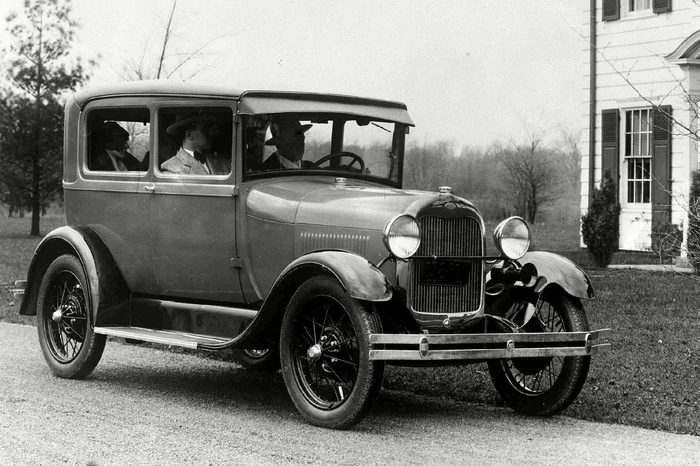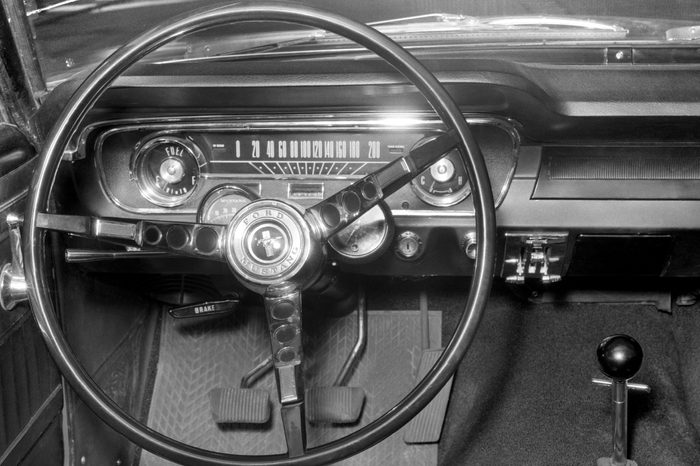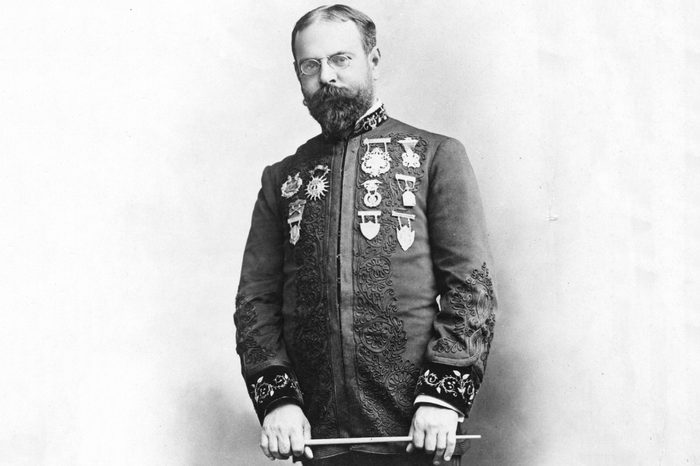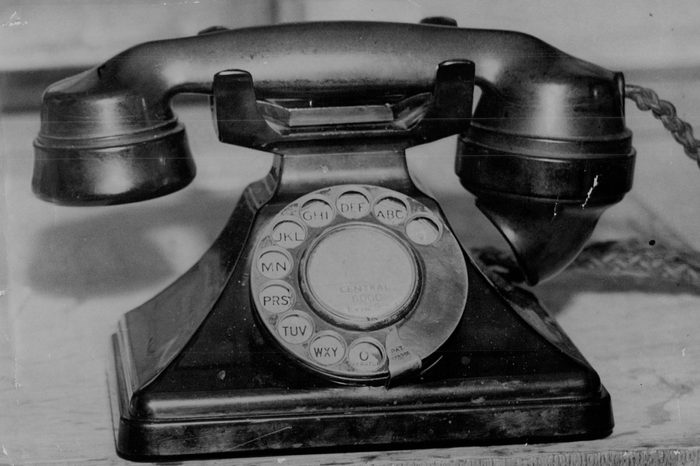
Cars are just a fad
In 1903, the president of Michigan Savings Bank warned Henry Ford’s lawyer Horace Rackham to protect his money. “The horse is here to stay but the automobile is only a novelty—a fad,” he advised. If you’ve ever been stuck trying to get out of a parking lot after a sporting event, you probably wish he got this one right. Speaking of getting things right, here are 16 history questions people always get wrong.

And our brains won’t be able to keep up with them
In 1904, The New York Times reported on a debate in Paris between a brain specialist and a physician about the dangers of driving automobiles at high speeds—because the brain can’t keep up. “It remains to be proved how fast the brain is capable of traveling,” reads the article. “If it cannot acquire an eight-mile per hour speed, then an auto running at the rate of 80 miles per hour is running without the guidance of the brain, and the many disastrous results are not to be marveled at.”

Everything will be made of steel
Thomas Edison invented the light bulb, but he couldn’t be right all the time: In an interview with the Miami Metropolis in 1911, he went all in on America’s booming steel industry, predicting, “The baby of the 21st century will be rocked in a steel cradle; his father will sit in a steel chair at a steel dining table, and his mother’s boudoir will be sumptuously equipped with steel furnishings, converted by cunning varnishes to the semblance of rosewood, or mahogany, or any other wood her ladyship fancies.” On the flip side, check out the 9 incredible historical predictions that actually came true.

Recorded music will destroy all musical ability
In 1906, composer John Philip Sousa warned the world about “The Menace of Mechanical Music” in an article attacking machines that brought symphonies into people’s homes. He bemoaned the fact that fewer and fewer cheap lutes were being purchased “all because the automatic music devices are usurping their places.” And he foresaw a dire era in which “music can be heard in the homes without the labor of study and close application, and without the slow process of acquiring a technique, it will be simply a question of time when the amateur disappears entirely, and with him a host of vocal and instrumental teachers, who will be without field or calling.” Someone should warn the School of Rock franchise.

Electricity is just a fad
So said Junius Morgan to his son J.P. Morgan. J.P. had hired Thomas Edison to wire up his mansion, making it the first private residence in New York to have electric lighting. Luckily for his bank account, J.P. Morgan didn’t listen to dad, and invested heavily in Edison, eventually financing General Electric. Don’t miss these 9 famous moments in history that never actually happened.

All women will be giants
In 1950, Associated Press writer Dorothy Roe used what she called “scientific evidence” to predict that by the year 2000, all women would be six feet tall. “Her proportions will be perfect, though Amazonian, because science will have perfected a balanced ration of vitamins, proteins, and minerals that will produce the maximum bodily efficiency, the minimum of fat,” she wrote. Women are taller on average nowadays, so Roe wasn’t totally off.

Cleaning the house will require only a hose
Waldemar Kaempffert, the science editor of the New York Times, wrote in 1950 of “Miracles You’ll See In The Next Fifty Years.” One of those miracles involved housekeeping. Kaempffert described the life and chores of a future housewife he named “Jane Dobson” thusly: “When Jane Dobson cleans house she simply turns the hose on everything. Why not? Furniture (upholstery included), rugs, draperies, unscratchable floors—all are made of synthetic fabric or waterproof plastic. After the water has run down a drain in the middle of the floor (later concealed by a rug of synthetic fiber), Jane turns on a blast of hot air and dries everything.”

We’re all going to live forever-ish
Sure, this prediction doesn’t expire until 2030, but somehow we’re a little doubtful it’ll come true. A friend of Winston Churchill, high-powered lawyer FE Smith, wrote in 1922 of medical advances he saw on the horizon. In part, he foresaw medical injections that would help humans live to 150 years old. He thought this was a good thing for the most part, but it did make him worry, “How will youths of 20 be able to compete in the professions or business against vigorous men still in their prime at 120, with a century of experience on which to draw”? While his prediction was dead wrong, these 11 lies changed the course of history.

Telephones will never catch on
In 1876, the President of Western Union, William Orton, dismissed phones as a “toy” when Alexander Graham Bell offered to sell him the patent for $100,000. According to True West magazine, Orton wrote an internal memo stating, “The idea is idiotic on the face of it. Furthermore, why would any person want to use this ungainly and impractical device when he can send a messenger to the telegraph office and have a clear written message sent to any large city in the United States?”

Especially phones that also act like computers
“There’s no chance that the iPhone is going to get any significant market share. No chance.” That’s what Steve Ballmer, the CEO of Microsoft said in 2007. OK, maybe a slight chance? If this shocked you, wait till you see the 18 history lessons your teacher lied to you about.

TVs aren’t really going to be a big thing
The 20th Century Fox kingpin Darryl Zanuck sniffed at the idea of idiot boxes keeping people out of the theater to see his company’s productions like How Green Was My Valley and The Grapes of Wrath. In 1946, he predicted, “Television won’t be able to hold on to any market it captures after the first six months. People will soon get tired of staring at a plywood box every night.”

The world will go ka-blooey at the stroke of midnight on January 1, 2000
Remember when most computers recorded dates using only the last two digits of every year? Well, when 2000 or “00” was about to roll around, lots of smart people feared computers would think it was 1900 or also “00,” and global data meltdowns and financial destruction would follow. Eh, not so much. The only thing that The Crisis That Never Was did was get its own nickname, Y2K. That’s something, right?

People will only want to shop in stores
In 1966, Time published an essay called “The Futurists” that looked ahead to life in the year 2000. Here’s one thing they thought would be rejected by humankind: “[R]emote shopping, while entirely feasible, will flop—because women like to get out of the house, like to handle the merchandise, like to be able to change their minds,” the essay said. Tell that to Amazon.com founder Jeff Bezos, the one with $146 billion bank account. Now that you know these false predictions, check out which of your 51 favorite “facts” are actually false.